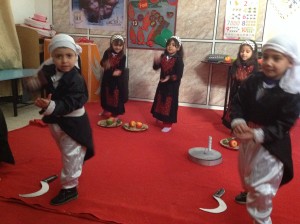The medical work continues: Day seven in Gaza, by Gerri Haynes
(Washington Physicians for Social Responsibility has been sponsoring delegations to Gaza since 1993. In 2009, the group began offering medical service work to the people of Gaza.)
Our various medical work continues: operating, consulting, teaching. We have traveled the length of Gaza (about the length of Lake Washington’s 27 miles) and visited with people along the way. The strong sense of family here helps us to understand how this population can endure and grow even while living under the constant threat of armed attack. The sound of fighter planes overhead reminds us that the threat is real.
This evening, Grant O’Keefe and Rich Grady each gave a talk at a Surgical Society Meeting. We were told how much it means to have colleagues from “the outside” join them here in Gaza as “we can’t get out to see you.”
Dr. Don Mellman wrote this today:
People are like tea bags; you never know how strong they are until they are in hot water. Source forgotten.
In this my fourth, or is it my fifth, trip to Gaza? I have been able to put the various issues that are raised into a perspective that is both historical and philosophical. The time spent in the sun and heat while waiting to just “enter” the wall erected by Israel to physically complete and represent its siege and occupation of Gaza, and the approximately three-quarters of a mile metal-enclosed trek that the Gazan authorities now willingly accept as the “cost of entry.” And, while I am at it, Israel’s Alice in Wonderland denial of the words “siege” and “occupation” to describe its treatment of Gaza brings the unsustainability of its actions into a stark “black comedy” reality.
Since my first trip into this surreal absurdity of “man’s-inhumanity-to-man,” I have thought much of Gaza and created formal presentations to several different audiences, which has forced me to articulate my ideas into a coherency that otherwise I would not have.
During this trip I have, as before, evaluated clinic patients with neurosurgical issues, assisted in the operating room, met with medical and human rights functionaries as they discuss their frustrations, and given talks on relationships (a concept Gaza has helped me to understand as the most important issue in life). But more importantly, the connections (read “relationships”) I have made with Basil Bakr, a neurosurgeon at al Shifa Hospital, and Husam al Nounou, from Gaza Community Mental Health Programme, have led to invitations into their homes, where I have been allowed into their personal lives and to share their families and food.
Thus, I have been able to witness their inner strengths and resilience as they cope with the severe political and economic restraints imposed by the self-aggrandizing leaders of the internal Fatah-Hamas disputes, the external Israel-Palestinian conflict, and the not-so-peripheral world community.
RSS feed for comments on this post. TrackBack URI
